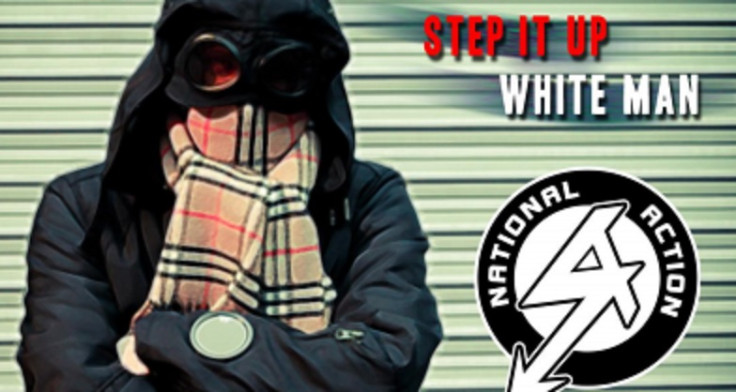Terror ban won't stop us campaigning say members of Neo-Nazi National Action group
Anti-semitic group tells IBTimes UK ban on group was 'symbolic revenge' by government.

A neo-Nazi group set to become the first far-right organisation proscribed by the government under terrorism laws has vowed to continue their extreme political activism under another guise.
National Action (NA), set up in 2013, was this week described by Home Secretary Amber Rudd as "a racist, anti-Semitic and homophobic organisation".
The white supremacist group has also been accused of encouraging violence, with members said to have praised far-right fanatic Thomas Mair as a hero after he murdered Labour MP Jo Cox earlier this year.
An order to add the group to a list of proscribed organisations is to be laid before parliament, with the ban set to come into place on Friday pending approval from MPs.
It means anyone who is a member of, or seeks support for, the group faces arrest under the Terrorism Act 2000 and up to 10 years in prison.
But Ben Raymond, a senior member of National Action, suggested the move could effectively become meaningless, saying the group's members and supporters would continue their activism under another guise.
He told IBTimes UK that the group would comply with the "outrageous" ban, saying that "the brand is not a hill any of us are willing to die on".
But he added: "If you are asking if the ban will prevent our former supporters from continuing political activity then obviously not ... People who were in National Action knew what it meant to face heavy adversity."
Raymond didn't say whether he and fellow activists were in the process of setting up another group to replace National Action, or whether its members would join other neo-Nazi organisations already operating in Britain.
He said simply that members of the group, whose demonstrations often only attract a couple dozen people, were "shocked" by the Home Secretary's ban, claiming the organisation was a "peaceful youth protest group" and that none of its members had ever been charged with a crime.
But Matthew Collins, director of research at anti-extremism charity Hope not Hate, said the organisation had over the past two years become "more violent" and "more hardened".
He said despite Raymond's claims, several members had been hauled before the courts and that his organisation has evidence of them encouraging or engaged in violence and anti-Semitism.
This includes, Collins said, the case of Garron Helm, a National Action member who was jailed after being found guilty of sending anti-Semitic tweets to Labour MP Luciana Berger.
"National Action's leadership has praised Hitler, attacked Jews, referred to itself as 'white jihadis' and courted notoriety online, often staging very small actions which are then blown out of all proportion by a gullible media," he said. "Many of these stunts would be laughable, were it not for those prepared to act on NA's violent message."
Collins said while his organisation "cautiously welcomes" the Home Secretary's proposed ban on National Action, current laws needed to be better enforced if the fight against the far-right was to be truly effective.
"If they [National Action] do form a new group, the police have to enact the laws that already exist," he said.
He added: "We feel the authorities could have dealt with National Action sooner and quicker under existing laws ... It has been clear to us and other observers that in the last 18-24 months this group has been preparing to step up its campaign, which we feel would have tragic and violent consequences."
Following the conviction of Mair for the murder of Jo Cox, Hope not Hate made renewed pleas for the authorities to take the "growing threat" from Britain's far-right more seriously.
The charity said while it might be numerically smaller than in the past, it is becoming more violent and dangerous.
It also claimed right-wing extremists and groups regularly get away with threats of violence and racist incitement that would not be tolerated if they were Muslim.
Raymond branded the government's decision to ban his own group a "purely symbolic act of revenge" which had no justification.
"They are terrified by Brexit, by Trump, and that their people hate them. I feel if they had not taken action against us, it would have been against some other group," he said.
He added: "Civil rights and civil liberties organisations have provided us with no support, I doubt any politician will challenge this unprecedented move."
Gideon Falter, Chairman of Campaign Against Antisemitism said he believed the ban on National Action would help prevent its members continuing their "incitement and violence".
He said: "In common with other terrorist groups, National Action radicalises and indoctrinates the young, teaches them violence, attacks the police and the public and demands the annihilation of Jews.
"This decision by the home secretary is something we have long called for and sends a strong message that the far-right is in the government's sights and will not be permitted to continue its incitement and violence."
© Copyright IBTimes 2025. All rights reserved.






















